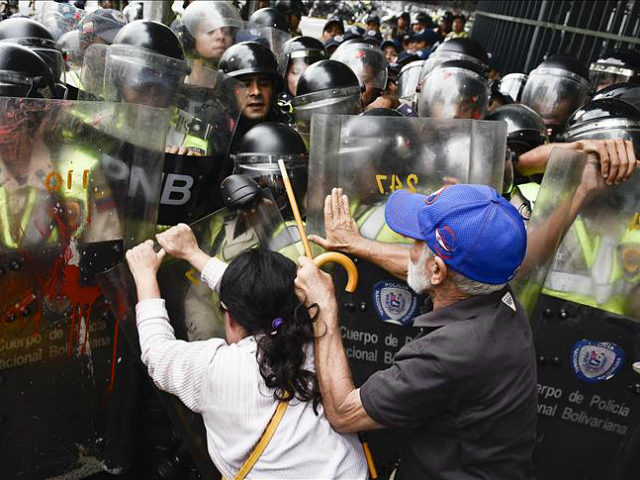Venezuela’s socialist dictator Nicolás Maduro claimed on national television Saturday that the nation’s anti-Chavista opposition was “murdering its own protesters,” listing individuals killed by Venezuelan soldiers and Chavista gangs and blaming the leadership of the opposition for staging the deaths to garner support for their cause.
Maduro did not present any evidence to justify his claim.
“These protests today are only in one percent of the nation,” Maduro claimed on state television. “They are more violent than ever, you have all seen cases where they have murdered their own protesters.”
He listed three cases of alleged staged murders, two shot to death and a third allegedly electrocuted. “If it weren’t for Julio Borges and the MUD none of these tragedies would have happened,” he alleged.
Borges is the president of the National Assembly, the federal legislative body, and a party leader in the coalition known as the Democratic Unity Roundtable (MUD). He has personally been the victim of state violence, beaten by a Chavista gang (colectivo) near the entrance of the National Assembly building in 2016. The gang succeeded in breaking his nose.
Maduro also blamed Borges personally in a separate video segment for allegedly sending a gang to kidnap a bus driver. Maduro did not explain who kidnapped the driver or why, but by Monday, Venezuelan state television was showcasing a photo opportunity with Maduro and the driver, identified as Leonardo Leconte, on its online front page.
At least 39 people have been killed in this most recent wave of anti-government protests, which began in March following an attempt by the Supreme Court to nullify the opposition-controlled National Assembly and establish itself as the chief lawmaking body. The Venezuelan newspaper El Universal lists among them two of the most recent cases that align with the descriptions Maduro used in his remarks: Miguel Fernando Castillo Bracho, 27, and Anderson Dugarte, 38, who were both shot to death.
The odds of opposition members being responsible for these shootings are barely existent, however, because of Venezuela’s strict anti-gun laws. The opposition is almost completely unarmed, as the private ownership of firearms is banned. Only criminal gangs and colectivos, some of whom operate as official paramilitaries, have the firearms used in these circumstances.
In 2014, Maduro opened “disarmament centers” to pressure the few remaining civilians possessing weapons to return them. Three years later, Maduro promised a firearm to every Chavista who swore to use them against the opposition, setting a goal of distributing one million firearms to “militiamen” working for the government.
Many other protester deaths cannot be explained as deeds of the opposition. Among the most notable are the protesters the military has killed on Maduro’s orders. In one particularly gruesome incident caught on video, soldiers ran unarmed protesters over using large armored vehicles, killing at least three.
Others among the 39 died without even meaning to protest, among them 87-year-old Ricarda González, who died asphyxiated by tear gas in her home. Only the military has access to tear gas and has used it liberally against protesters.
Maduro’s claim that the opposition is killing their own people recalls propaganda tactics used by its allies in the Middle East. The government of Iran, a longtime Chavista ally, has been particularly bold in denying violence that investigators have traced back to them.
In 2015, when Uruguayan officials accused the Iranian government of using employees at its embassy to plant explosives near the Israeli embassy in Montevideo, Iranian officials accused Israel of bombing its own embassy to “create Iranophobia and tarnish the Islamic Republic’s international image.”
“Tehran has said in the past that Tel Aviv has ordered attacks against its own embassies in India and Georgia in order to damage Iran’s image in the host countries,” the Iranian government said at the time.
Similarly, another ally of Tehran’s, Syria’s Bashar al-Assad, has accused Syrian rebels of attacking its own to frame his government for assorted human rights abuses. Following a Syrian government chemical weapons attack on civilians in April, Assad said the United States and Syrian rebels “fabricated the whole story in order to have a pretext for the attack [a U.S. airstrike against the Syrian air force].”

COMMENTS
Please let us know if you're having issues with commenting.